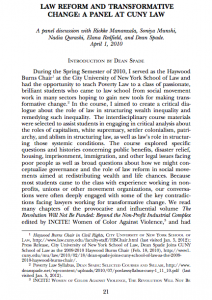Editor’s Note: The following excerpt contains Dean Spade’s introduction to a panel discussion with Rickke Mananzala, Soniya Munshi, Nadia Qurashi, Elana Redfield, and Dean Spade. April 1, 2010. Dean Spade served as the Haywood Burns Chair at the City University of New York School of Law for 2010, and recently published the book Normal Life: Administrative Violence, Critical Trans Politics and the Limits of the Law (2012). Click here for the full transcript.
During the Spring Semester of 2010, I served as the Haywood Burns Chair [FN 1] at the City University of New York School of Law and had the opportunity to teach Poverty Law to a class of passionate, brilliant students who came to law school from social movement work in many sectors hoping to gain new tools for making transformative change. [FN 2] In the course, I aimed to create a critical dialogue about the role of law in structuring wealth inequality and remedying such inequality. The interdisciplinary course materials were selected to assist students in engaging in critical analysis about the roles of capitalism, white supremacy, settler colonialism, patriarchy, and ablism in structuring law, as well as law’s role in structuring those systemic conditions. The course explored specific questions and histories concerning public benefits, disaster relief, housing, imprisonment, immigration, and other legal issues facing poor people as well as broad questions about how we might conceptualize governance and the role of law reform in social movements aimed at redistributing wealth and life chances. Because most students came to the class with experience working in non-profits, unions, or other movement organizations, our conversations were often deeply engaged with some of the key contradictions facing lawyers working for transformative change. We read many chapters of the provocative and influential volume The Revolution Will Not Be Funded: Beyond the Non-Profit Industrial Complex edited by INCITE! Women of Color Against Violence, [FN 3] and had passionate conversations about how the non-profitization of social movements has impacted the demands and strategies of social movements and what role lawyers have had in that change. We also talked extensively about the limitations of legal reform, and the tendency of law, when faced with demands for transformative change by organized resistance formations, to transform just enough to preserve the status quo. [FN 4] Through our readings of key texts like Welfare Racism: Playing the Race Card Against America’s Poor [FN 5] by Kenneth J. Neubeck and Noel A. Cazenave, Are Prisons Obsolete? [FN 6] by Angela Davis, “Heteropatriarchy and the Three Pillars of White Supremacy” [FN 7] by Andrea Smith, Regulating the Poor [FN 8] by Francis Fox Piven and Richard Cloward, “Society Must Be Defended” [FN 9] by Michel Foucault, “Whiteness as Property” [FN 10] by Cheryl Harris, and others, we reached significant dilemmas. If the welfare system exists to stabilize capitalist economic arrangements, what is the role of welfare lawyers seeking to maintain or expand benefits in a strategy for dismantling capitalism? If the prison industrial complex is an extension of chattel slavery and reform efforts tend to expand its work of racial violence, how should lawyers seeking to alleviate harms facing imprisoned people do our work? If we want to end immigration enforcement, and reforms that adjust immigration policies for certain sympathetic subgroups tend to justify or legitimize immigration enforcement even though they provide desperately needed relief to a few, should we engage with them? We asked many questions that brought up these tensions about legal strategy, reform and social movement demands. Toward the end of the semester we were lucky to have a panel of innovative and talented activists working at the cutting edge of these issues join us for a discussion on these themes. The edited transcript of the proceedings is below.
[FN 1] Haywood Burns Chair in Civil Rights, City University of N.Y. School of Law, http://www.law.cuny.edu/faculty-staff/HBChair.html (last visited Jan. 5, 2012); Press Release, City University of New York School of Law, Dean Spade Joins CUNY School of Law as the 2009-2010 Haywood Burns Chair (Feb. 18, 2010), http://www1. cuny.edu/mu/law/2010/02/18/dean-spade-joins-cuny-school-of-law-as-the-2009- 2010-haywood-burns-chair/. [FN 2] Poverty Law Syllabus, Dean Spade: Selected Courses and Syllabi, http://www. deanspade.net/wp-content/uploads/2010/07/povlawsyllabus-cuny-1_11_10.pdf (last visited Jan. 5, 2012). [FN 3] INCITE! Women of Color Against Violence, The Revolution Will Not Be Funded: Beyond the Non-Profit Industrial Complex (INCITE! Women of Color Against Violence ed., 2007). [FN 4] See Angela P. Harris, From Stonewall to the Suburbs? Toward a Political Economy of Sexuality, 14 Wm. & Mary Bill Rts. J. 1539, 1540 (2006) (quoting Reva Seigel, Why Equal Protection No Longer Protects: The Evolving Forms of Status-Enforcing State Action, 49 Stan. L. Rev. 1111, 1113 (1997)). [FN 5] Kenneth J. Neubeck & Noel A. Cazenave, Welfare Racism: Playing the Race Card Against America’s Poor (Routledge 2001). [FN 6] Angela Davis, Are Prisons Obsolete? (Seven Stories Press 2003). [FN 7] Andrea Smith, Heteropatriarchy and the Three Pillars of White Supremacy: Rethinking Women of Color Organizing, in Color of Violence: The INCITE! Anthology 66-73 (INCITE! Women of Color Against Violence ed., South End Press, 2006). [FN 8] Francis Fox Piven & Richard Cloward, Regulating the Poor: The Functions of Public Welfare (Vintage 1993). [FN 9] Michel Foucault, Society Must be Defended: Lectures at the College de France, 1975—76, (David Macey trans., Picador 2003). [FN 10] Cheryl I. Harris, Whiteness as Property, 106 Harv. L. Rev. 1707 (1993).

